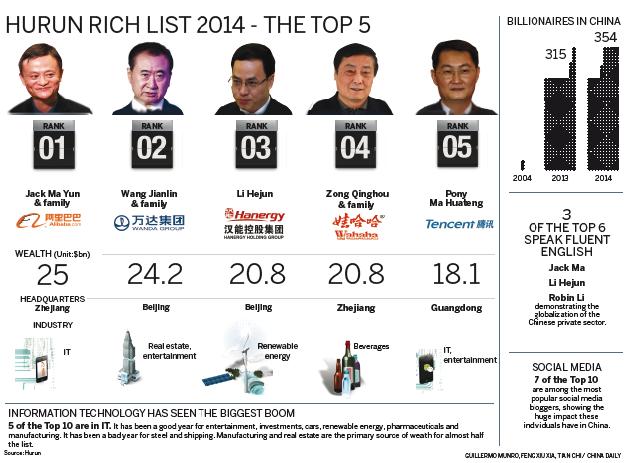
Wealth list filling up with tech tycoons like Alibaba’s Ma Yun
Information technology has overtaken real estate as the cradle of the next generation of Chinese billionaires, according to the 2014 Hurun China Rich List released on Tuesday.
The rise of IT billionaires is exemplified by China's new richest man, Jack Ma Yun, founder of e-commerce giant Alibaba, whose personal wealth soared to $25 billion on the company's first day of trading.
Ma's wealth is the highest of anyone on the list since Shanghai-based Hurun started documenting Chinese rich 16 years ago, reflecting the rapidly growing Chinese e-commerce industry.
Based on 600 million Internet users and an annual e-commerce growth rate of 120 percent, China will soon become “the largest e-commerce market in the world”, said Patrick Dodd, managing director of Nielsen China.
Rupert Hoogewerf, chairman and chief researcher of the Hurun Report, described Ma's success as “a stark reminder of the growth potential that is being realized in the emerging markets”.
Including Ma, five of the top 10 billionaires on this year's list come from the IT industry, two more than last year.
“A large number of IT companies have accelerated the process of going public over the past two years. At the same time, the integration within the industry has also reached its peak. Therefore, the wealth of the IT industry has highly concentrated,” Hoogewerf said.
Justin Ren, associate professor of operations and technology management at Boston University's School of Management, said with the Internet taking a larger piece of the Chinese economy, it is natural that more billionaires will be from this sector.
According to a recent study by research organization McKinsey Global Institute, the Internet sector could fuel 7 to 22 percent of the incremental GDP growth through 2025, which could translate into 4 trillion yuan ($650 billion) to 14 trillion yuan in China's annual GDP.
The rise of Chinese IT billionaires is also in line with the global trend. In the 2014 Hurun Global Rich List unveiled at the beginning of this year, 257 people from the IT industry made it onto the list, 57 more than that a year earlier and accounting for 13.7 percent of the more than 1,000 individuals listed.
It is the first time that the IT industry has dislodged real estate to become the cradle of the largest number of billionaires globally.
Hoogewerf also predicted that more Chinese billionaires will come from new media and entertainment, as the number of billionaires from traditional industries such as property, manufacturing and mining has been declining.
He also believed bio-technology and renewable energy are very likely to give birth to a brand new Alibaba or another new tycoon like Jack Ma.
This year's third place winner Li Hejun, chairman and CEO of Hanergy Holdings Group, is one example for the rise of the new energy industry, as he has been making acquisitions in the US and Europe to shore up his advantage in China's solar power industry. His personal wealth is as much as $20.8 billion.
However, this year's list shows the effect that the corruption crackdown and austerity program has had on current and former members of the rich list, with several now facing criminal punishment or fleeing overseas.
They include Liu Han of conglomerate Hanlong, who was sentenced to death for gang crimes, and Xu Ming of conglomerate Shide who is awaiting sentencing in a corruption case linked to disgraced politician Bo Xilai.
“The anti-corruption drive has a strong effect. We found 18 people from last year's list in trouble with the authorities,” Hoogewerf said.
Meng Jing and AFP contributed to this story.
